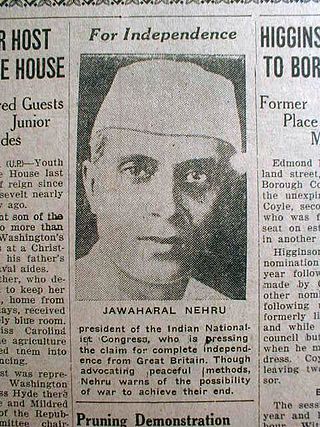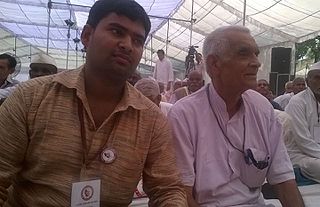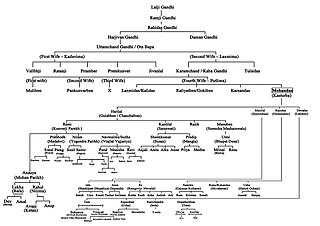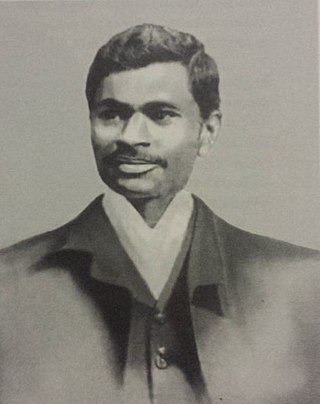
Mohandas Karamchand Gandhi was an Indian lawyer, anti-colonial nationalist and political ethicist who employed nonviolent resistance to lead the successful campaign for India's independence from British rule. He inspired movements for civil rights and freedom across the world. The honorific Mahātmā, first applied to him in South Africa in 1914, is now used throughout the world.

Satyāgraha, or "holding firmly to truth", or "truth force", is a particular form of nonviolent resistance or civil resistance. Someone who practises satyagraha is a satyagrahi.

The Story of My Experiments with Truth is the autobiography of Mohandas Karamchand Gandhi, covering his life from early childhood through to 1921. It was written in weekly installments and published in his journal Navjivan from 1925 to 1929. Its English translation also appeared in installments in his other journal Young India. It was initiated at the insistence of Swami Anand and other close co-workers of Gandhi, who encouraged him to explain the background of his public campaigns. In 1998, the book was designated as one of the "100 Best Spiritual Books of the 20th Century" by a committee of global spiritual and religious authorities.

Swarāj can mean generally self-governance or "self-rule". It was first used by Shivaji to attain self rule from the Mughal Empire and the Adilshahi sultanate. Later, the term was used synonymously with "home-rule" by Maharishi Dayanand Saraswati and later on by Mahatma Gandhi, but the word usually refers to Gandhi's concept of Indian independence from foreign domination. Swaraj lays stress on governance, not by a hierarchical government, but by self-governance through individuals and community building. The focus is on political decentralisation. Since this is against the political and social systems followed by Britain, Gandhi's concept of Swaraj advocated India's discarding British political, economic, bureaucratic, legal, military, and educational institutions. S. Satyamurti, Chittaranjan Das and Motilal Nehru were among a contrasting group of Swarajists who laid the foundation for parliamentary democracy in India.

Gandhism is a body of ideas that describes the inspiration, vision, and the life work of Mohandas K. Gandhi. It is particularly associated with his contributions to the idea of nonviolent resistance, sometimes also called civil resistance.
"A Letter to a Hindu" was a letter written by Leo Tolstoy to Tarak Nath Das on 14 December 1908. The letter was written in response to two letters sent by Das, seeking support from the Russian author and thinker for India's independence from colonial rule. The letter was published in the Indian newspaper Free Hindustan. The letter caused the young Mohandas Karamchand Gandhi to write to Tolstoy to ask for advice and for permission to reprint the Letter in Gandhi's own South African newspaper, Indian Opinion, in 1909. Gandhi was living in South Africa at the time and just beginning his activist career. He then translated the letter himself, from the original English copy sent to India, into his native Gujarati.

The Declaration of Purna Swaraj was a resolution which was passed in 1930 because of the dissatisfaction among the Indian masses regarding the British offer of Dominion status to India. The word Purna Swaraj was derived from Sanskrit पूर्ण (Pūrṇa) 'Complete', and स्वराज (Svarāja) 'Self-rule or Sovereignty', or Declaration of the Independence of India, it was promulgated by the Indian National Congress, resolving the Congress and Indian nationalists to fight for Purna Swaraj, or complete self-rule/total independence from the British rule
Gandhian socialism is the branch of socialism based on the national interpretation of the theories of Mahatma Gandhi. Gandhian socialism generally centers on Hind Swaraj or Indian Home Rule authored by Gandhi.
Gandhian economics is a school of economic thought based on the spiritual and socio-economic principles expounded by Indian leader Mahatma Gandhi. It is largely characterised by rejection of the concept of the human being as a rational actor always seeking to maximize material self-interest that underlies classical economic thinking. Where Western economic systems were based on what he called the “multiplication of wants,” Gandhi felt that this was both unsustainable and devastating to the human spirit. His model, by contrast, aimed at the fulfillment of needs – including the need for meaning and community. As a school of economics the resulting model contained elements of protectionism, nationalism, adherence to the principles and objectives of nonviolence and a rejection of class war in favor of socio-economic harmony. Gandhi's economic ideas also aim to promote spiritual development and harmony with a rejection of materialism. The term "Gandhian economics" was coined by J. C. Kumarappa, a close supporter of Gandhi.

Young India was a weekly paper or journal in English founded by Lala Lajpat Rai in 1916 and later published by Mahatma Gandhi. Through this work, Mahatma Gandhi sought to popularise India's demand for independence or Swaraj.

Mahatma Gandhi Museum was formerly Alfred High School in Rajkot was one of the oldest educational institutions in India which was active for 164 years where Mahatma Gandhi studied few years.
The Aundh Experiment was an early test of village-level self-government in British India which began in 1938 in Aundh State in present-day Maharashtra. Mohandas Gandhi, and Maurice Frydman helped to draft the November Declaration, which handed over rule of Aundh State from the Raja to the residents, and became law in the Swaraj Constitution of Aundh in 1939. The Aundh Experiment was an unusual idea in pre-independence India, where the rulers of princely states were loath to hand over their power.

Ramjee Singh is a former Member of Parliament and vice-chancellor of Jain Vishva Bharati University. He is an eminent Gandhian and is the author of a number of books on him. He was also the director of Gandhian Institute of Studies, Varanasi, India. In January 2020 he was awarded the fourth highest civilian award in the country: The Padma Shri for Social Work. His life has been a blend of being a Gandhian academician as well as an activist. Singh has declared Mahatma Gandhi as the Bodhisattva of the 20th century.

The online Gandhi Heritage Portal preserves, protects, and disseminates original writings of Mohandas K. Gandhi and makes available to the world the large corpus of “Fundamental Works” which are useful for any comprehensive study of the life and thought of Gandhiji. Gandhiji was 24 years old in South Africa "Natal Indian Congress " made in 1894.

The Gandhi family is the family of Mohandas Karamchand Gandhi, commonly known as Mahatma Gandhi; Mahatma meaning "high souled" or "venerable" in Sanskrit; the particular term 'Mahatma' was accorded Mohandas Gandhi for the first time while he was still in South Africa, and not commonly heard as titular for any other civil figure even of similarly rarefied stature or living or posthumous presence.

Tridip Suhrud is an Indian writer, political scientist, cultural historian and translator from Gujarat, India.

Sri Ram Mehrotra was an Indian professor of history who published on the history of the Indian independence movement, the Indian National Congress, the life and work of its founder Allan Octavian Hume, and on the writings and philosophy of Gandhi. He also wrote a biography of Pranjivan Mehta, an important but little-known influence in the Indian independence movement who supported Gandhi. Mehrotra was known for his meticulous detail to sources and care in interpretations and published several annotated collections of sources and letters relating to Hume and towards the end of his life, Dadabhai Naoroji.

Pranjivandas Jagjivandas Mehta was a Mumbai-born physician, lawyer and jeweller who settled in Burma. He was a close friend of Mahatma Gandhi, helping Gandhi in England, helping him return from South Africa to India and sponsoring him. He also helped Gandhi articulate and elucidate his vision of India in the Hind Swaraj which was written primarily for Mehta. In 1909 he wrote a letter to Gokhale recognising Gandhi as a Mahatma, well before Gandhi was given that title.

Henry Salomon Leon Polak was a British-born lawyer, journalist and activist in South Africa who worked in collaboration with Mohandas Gandhi against racial discrimination. He served as an editor for the journal Indian Opinion and influenced by Theosophy, he believed in humanism and worked for the British Indian Association and several other causes.















